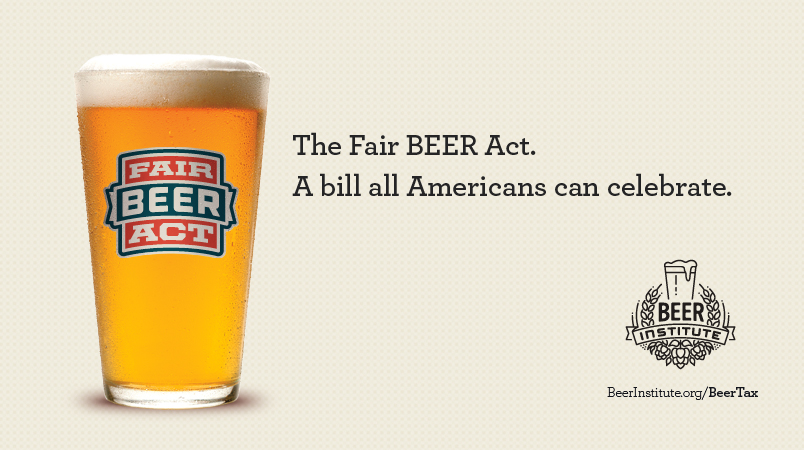Earlier this year, a bipartisan group of Senators and Congressmen introduced the Fair Brewers Excise and Economic Relief Act of 2015, or Fair BEER Act. This reform legislation creates a graduated tax structure for brewers, simplifying the tax code for the folks who brew America’s favorite adult beverage. According to beer industry group the Beer Institute, the federal tax on beer is a major contributor to the total tax burden on beer, with an estimated 40 percent of the retail price of a cold one going toward taxes of various forms.
Here are five key points about the Fair BEER Act:
It’s fair to all beer consumers
The Fair BEER Act simplifies and reforms the federal beer tax in an equitable, comprehensive way for all companies that brew or import beer. The beer aisles of America are packed with brands from beer companies ranging from national brewers and beer importers to large regional companies and small single-location brew-pubs and microbreweries. The Fair BEER Act legislation gives relief to all of these players. Many agree that Congress should not pick winners and losers in the marketplace through unfair tax legislation. Under this bill, regardless of the beer brand or style a consumer picks up, the invisible federal tax they pay on that pint, six-pack or case will be equitable.
Do you know your tax burden as a #beer drinker? #beertax pic.twitter.com/Im0qaT1OeW
— Beer Institute (@beerinstitute) February 4, 2015
A simpler graduated tax helps small brewers the most
The vast majority of brewers in the U.S. are small businesses who would have their federal excise tax reduced from $7 per barrel to zero under the Fair BEER Act. The legislation would eliminate the federal excise tax for brewers who produce up to 7,143 barrels. For every barrel between 7,143 and 60,000, brewers would pay $3.50 a barrel. For every barrel between 60,001 and 2 million, brewers would pay $16 per barrel. And after 2 million barrels, brewers would pay $18 per barrel. A brewer with annual output of 7,000 barrels would save $49,000 per year. That’s enough money to hire a full-time employee, invest in new equipment, cover the cost of more ingredients or market the brewery. Comparatively, the big players would save just pennies on the barrel.

The Fair BEER Act protects beer workers (who are the best workers, right?)
The Fair BEER Act protects brewing jobs across the country – whether it’s a job in a large brewing company that pays average annual wages and benefits of $88,000, or jobs in small breweries and brew pubs that offer employees an average of $43,000 per year. When the federal tax on beer was doubled in the 1990s, about 60,000 jobs were lost in the industry. A similar tax hike would be devastating to this dynamic, innovative industry.
The #FairBEERAct protects jobs across the industry. http://t.co/dzr85smqTK http://t.co/hxxIIZGjeY
— Beer Institute (@beerinstitute) March 18, 2015
It completely removes federal excise taxes for the smallest breweries
Today, more than 90 percent of all federally-permitted brewers produce fewer than 7,143 barrels. That first production threshold in the Fair BEER Act was designed by Congress to meet existing federal definitions of small brewers as laid out by the U.S. Department of the Treasury’s Alcohol and Tobacco Tax and Trade Bureau in a September rule easing paperwork requirements. By completely removing their federal excise tax, Congress is encouraging growth and removing barriers to the marketplace for new entrants.

Breweries employ a lot of Americans
Beer is a major business in the United States, contributing nearly $250 billion to the economy and supporting jobs for about two million Americans. Jobs inside of breweries are at the top of a network of supplier jobs such as hop and grain growers, package manufacturers, distributors, and even sales clerks in grocery and convenience stores. The Beer Institute estimates that every job in the brewery supports another 45 jobs in other industries like agriculture, marketing, manufacturing, transportation, warehousing, financial services, grocery, restaurant and retail.






